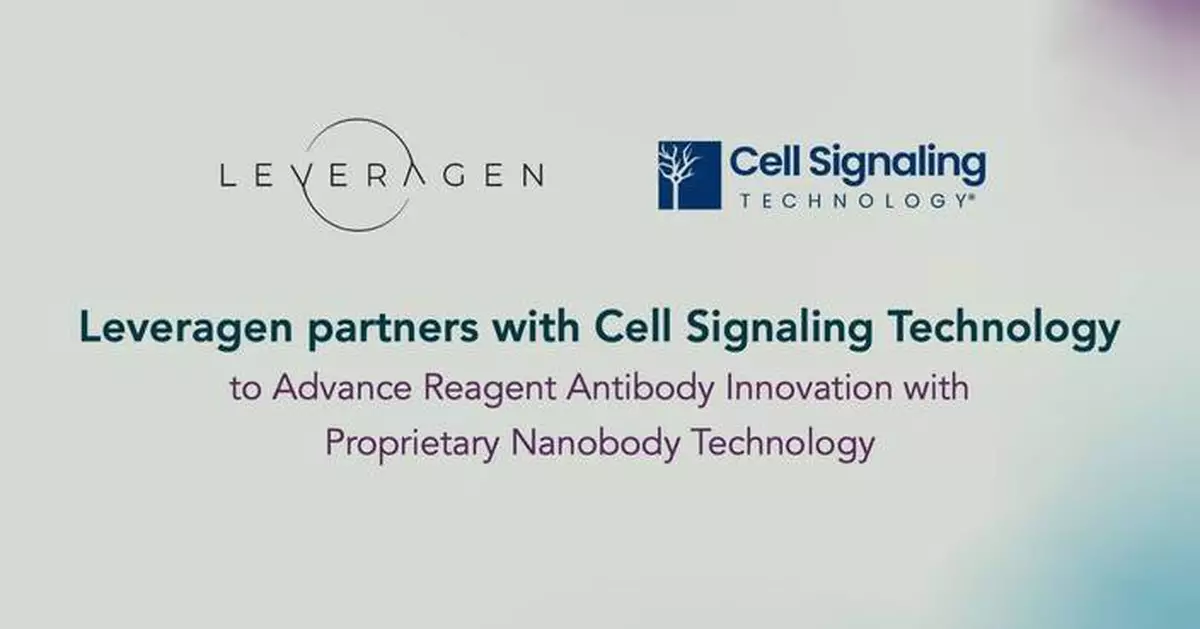BOSTON--(BUSINESS WIRE)--Mar 25, 2025--
This press release features multimedia. View the full release here: https://www.businesswire.com/news/home/20250325009806/en/
Nanobodies, or single-domain antibodies, are only about 10% the size of traditional antibodies, yet retain high target-binding affinity, exhibit enhanced tissue penetration, and can tackle structurally-challenging targets inaccessible to some full-length antibodies. Leveragen’s Singularity Suite of nanobody mice harnesses cutting-edge genetic engineering technologies to remove competing conventional antibodies and preserve native immunoglobulin gene regulation, maximizing nanobody-specific immune responses and maintaining normal B-cell development. Similar to its flagship Singularity Sapiens platform of fully human single-domain antibodies developed for therapeutic applications, the Singularity Musculus platform is purpose-built to generate mouse-derived nanobodies with superior diversity, affinity, stability, and cost-efficiency—traits critical to developing high-performance reagents for research and diagnostic applications.
“We are excited to begin this partnership with CST, marking a major milestone that underscores our commitment to antibody innovation,” said Dr. Weisheng Chen, Founder and Chief Executive Officer of Leveragen Inc. “Our Singularity Musculus platform was developed specifically to meet the growing need for versatile, diverse, and reproducible reagent antibodies. By merging our proprietary Singularity Musculus platform with CST’s renowned expertise in antibody reagents, we aim to raise the bar for nanobody-based tools throughout the life sciences.”
Dr. Roberto Polakiewicz, Chief Scientific Officer at Cell Signaling Technology, commented, “We are delighted to collaborate with Leveragen to explore the Singularity Musculus platform and its potential to advance reagent antibody development for researchers around the world.”
This partnership highlights the growing significance of nanobody-based technologies in areas including basic research, diagnostics, and therapeutic development. With their small molecular footprint, modular monomeric structure, robust binding affinity, and suitability for certain challenging antigens, nanobodies are uniquely positioned for high-throughput screening, precision imaging, and other advanced life science applications. By combining Leveragen’s and CST’s expertise, the collaboration aims to accelerate the creation of next-generation reagent antibodies.
About Leveragen
Leveragen is a genetic engineering company dedicated to transforming antibody discovery and development for research, diagnostics, and therapeutics. Operating exclusively from its Woburn, Massachusetts facility, the company employs advanced genome editing, synthetic biology, and chromosomal engineering technologies to develop next-generation genetic models that accelerate antibody discovery. Leveragen’s proprietary collection of nanobody mice, the Singularity Suite, features Singularity Sapiens, designed to generate fully human single-domain antibodies for developing a broad range of biologic modalities, and Singularity Musculus, engineered to produce mouse-derived single-domain antibodies optimized for high-performance reagent applications. Through strategic collaborations with global pharmaceutical and biotechnology leaders, the company addresses unmet medical needs and accelerates the translation of scientific breakthroughs into practical solutions. For more information, please visit www.leveragen.com.
About Cell Signaling Technology
Cell Signaling Technology (CST), headquartered in Danvers, Massachusetts, is a global leader in the development and production of high-quality research antibodies, reagents, and related technologies. Established in 1999 by scientists committed to furthering cellular and molecular research, CST has earned a reputation for excellence through rigorous validation processes, innovative products, and dedication to reproducibility. Serving academia, pharmaceuticals, and biotechnology worldwide, CST provides tools that help researchers investigate complex signaling pathways, uncover disease mechanisms, and accelerate therapeutic discovery. With a focus on quality and customer service, CST remains at the cutting edge of life science innovation. Learn more at www.cellsignal.com.


Leveragen Inc., a Boston-based biotechnology company specializing in next-generation genetic models for antibody discovery, today announced a comprehensive collaboration with Cell Signaling Technology (CST), a global leader in high-quality research antibodies and associated reagents. This collaboration will explore Leveragen’s proprietary Singularity Musculus platform to expedite the development of mouse-derived nanobodies tailored for reagent antibody applications.
MINNEAPOLIS (AP) — Federal agents carrying out immigration arrests in Minnesota's Twin Cities region already shaken by the fatal shooting of a woman rammed the door of one home Sunday and pushed their way inside, part of what the Department of Homeland Security has called its largest enforcement operation ever.
In a dramatic scene similar to those playing out across Minneapolis, agents captured a man in the home just minutes after pepper spraying protesters outside who had confronted the heavily armed federal agents. Along the residential street, protesters honked car horns, banged on drums and blew whistles in attempts to disrupt the operation.
Video of the clash taken by The Associated Press showed some agents pushing back protesters while a distraught woman later emerged from the house with a document that federal agents presented to arrest the man. Signed by an immigration officer, the document — unlike a warrant signed by a judge — does not authorize forced entry into a private residence. A warrant signed by an immigration officer only authorizes arrest in a public area.
Immigrant advocacy groups have conducted extensive “know-your-rights” campaigns urging people not to open their doors unless agents have a court order signed by a judge.
But within minutes of ramming the door in a neighborhood filled with single-family homes, the handcuffed man was led away.
More than 2,000 immigration arrests have been made in Minnesota since the enforcement operation began at the beginning of December, said Homeland Security spokesperson Tricia McLaughlin.
Homeland Security Secretary Kristi Noem told Fox News on Sunday that the administration would send additional federal agents to Minnesota to protect immigration officers and continue enforcement.
The Twin Cities — the latest target in President Donald Trump’s immigration enforcement campaign — is bracing for what is next after 37-year-old Renee Good was shot and killed by an immigration officer on Wednesday.
“We’re seeing a lot of immigration enforcement across Minneapolis and across the state, federal agents just swarming around our neighborhoods,” said Jason Chavez, a Minneapolis city councilmember. “They’ve definitely been out here.”
Chavez, the son of Mexican immigrants who represents an area with a growing immigrant population, said he is closely monitoring information from chat groups about where residents are seeing agents operating.
People holding whistles positioned themselves in freezing temperatures on street corners Sunday in the neighborhood where Good was killed, watching for any signs of federal agents.
More than 20,000 people have taken part in a variety of trainings to become “observers” of enforcement activities in Minnesota since the 2024 election, said Luis Argueta, a spokesperson for Unidos MN, a local human rights organization .
“It’s a role that people choose to take on voluntarily, because they choose to look out for their neighbors,” Argueta said.
The protests have been largely peaceful, but residents remained anxious. On Monday, Minneapolis public schools will start offering remote learning for the next month in response to concerns that children might feel unsafe venturing out while tensions remain high.
Many schools closed last week after Good’s shooting and the upheaval that followed.
While the enforcement activity continues, two of the state’s leading Democrats said that the investigation into Good's shooting death should not be overseen solely by the federal government.
Minneapolis Mayor Jacob Frey and U.S. Sen. Tina Smith said in separate interviews Sunday that state authorities should be included in the investigation because the federal government has already made clear what it believes happened.
“How can we trust the federal government to do an objective, unbiased investigation, without prejudice, when at the beginning of that investigation they have already announced exactly what they saw — what they think happened," Smith said on ABC’s "This Week."
The Trump administration has defended the officer who shot Good in her car, saying he was protecting himself and fellow agents and that Good had “weaponized” her vehicle.
Todd Lyons, acting director of U.S. Immigration and Customs Enforcement, defended the officer on Fox News Channel’s “The Sunday Briefing.”
"That law enforcement officer had milliseconds, if not short time to make a decision to save his life and his other fellow agents,” he said.
Lyons also said the administration’s enforcement operations in Minnesota wouldn't be needed “if local jurisdictions worked with us to turn over these criminally illegal aliens once they are already considered a public safety threat by the locals.”
The killing of Good by an ICE officer and the shooting of two people by federal agents in Portland, Oregon, led to dozens of protests in cities across the country over the weekend, including New York, Los Angeles, Washington D.C. and Oakland, California.
Contributing were Associated Press journalists Giovanna Dell’Orto in Minneapolis; Thomas Strong in Washington; Bill Barrow in Atlanta; Christopher Weber in Los Angeles; and John Seewer in Toledo, Ohio.
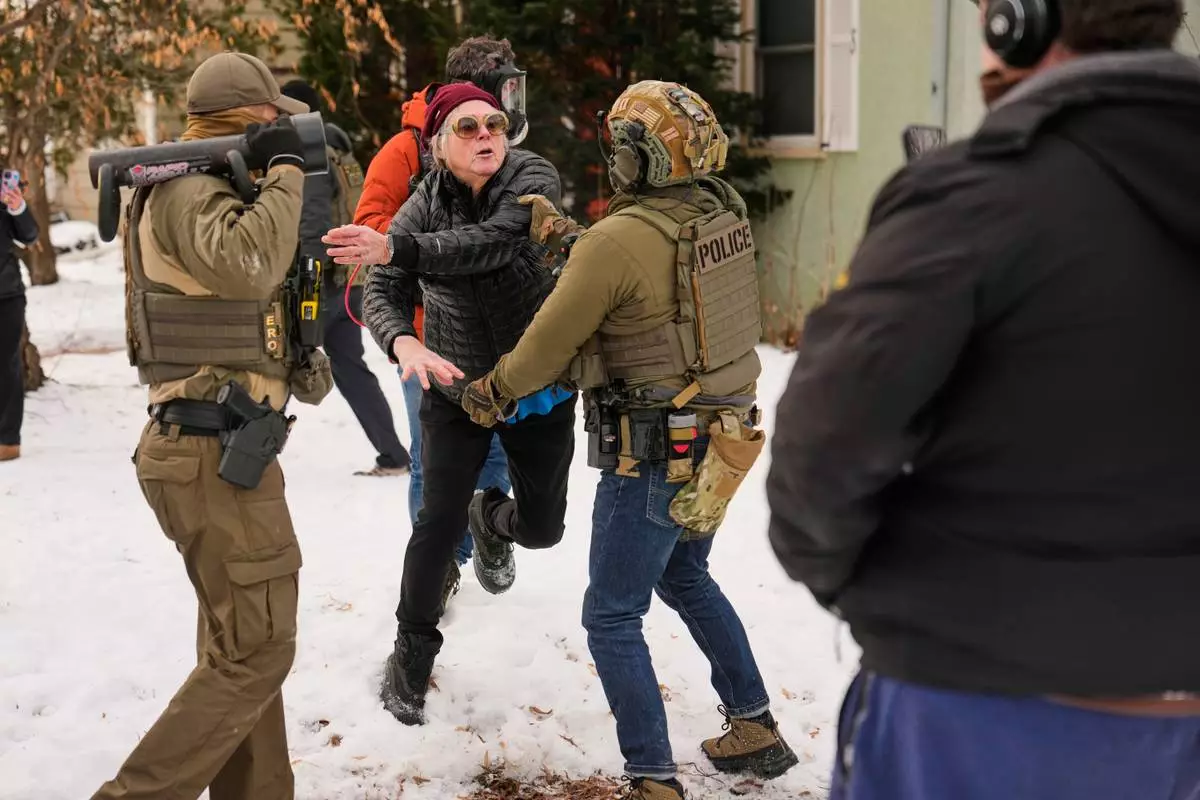
A woman gets into an altercation with a federal immigration officer as officers make an arrest Sunday, Jan. 11, 2026, in Minneapolis. (AP Photo/John Locher)
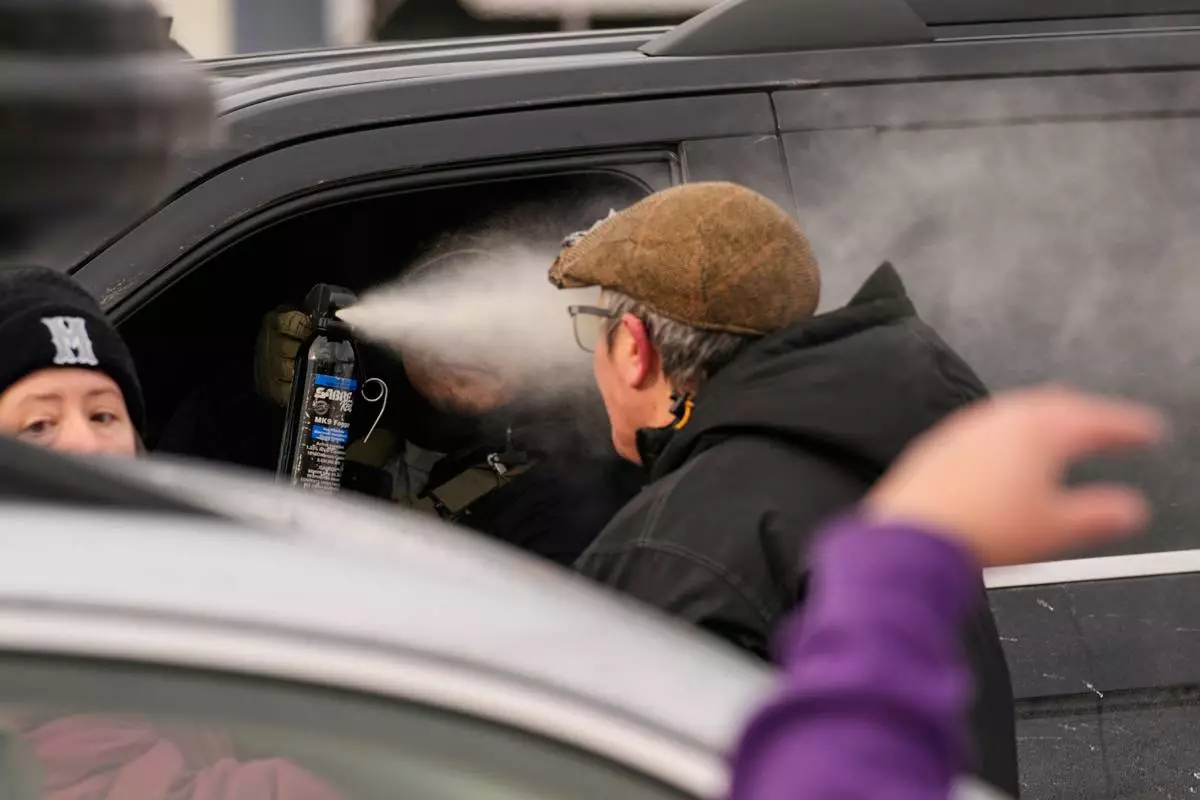
A federal immigration officer deploys pepper spray as officers make an arrest Sunday, Jan. 11, 2026, in Minneapolis. (AP Photo/John Locher)
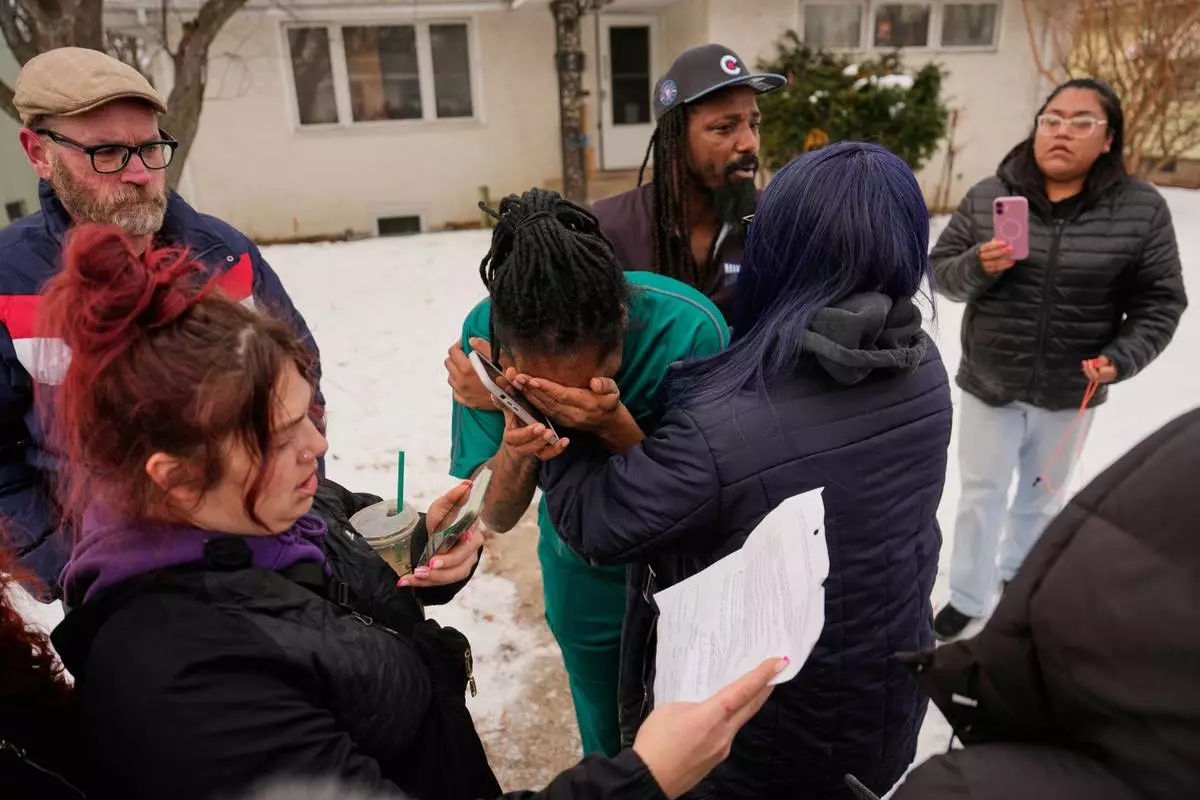
A family member, center, reacts after federal immigration officers make an arrest Sunday, Jan. 11, 2026, in Minneapolis. (AP Photo/John Locher)
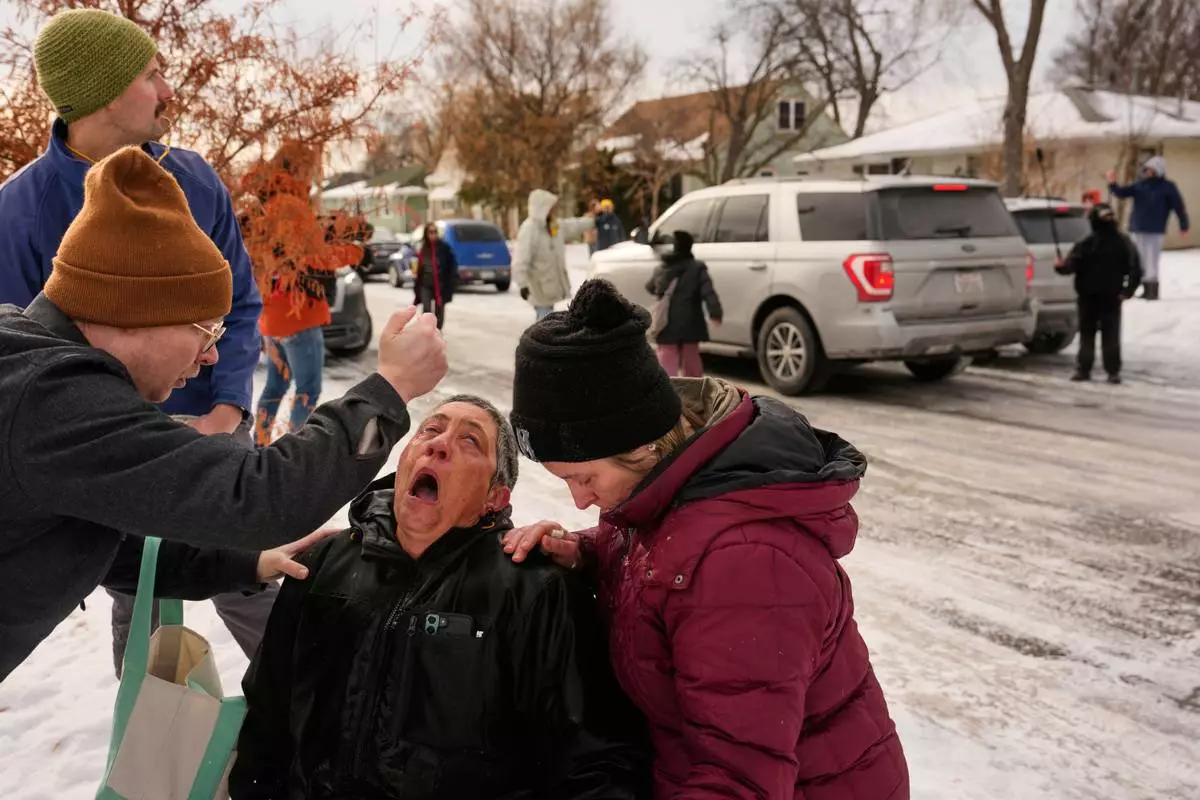
Bystanders are treated after being pepper sprayed as federal immigration officers make an arrest Sunday, Jan. 11, 2026, in Minneapolis. (AP Photo/John Locher)
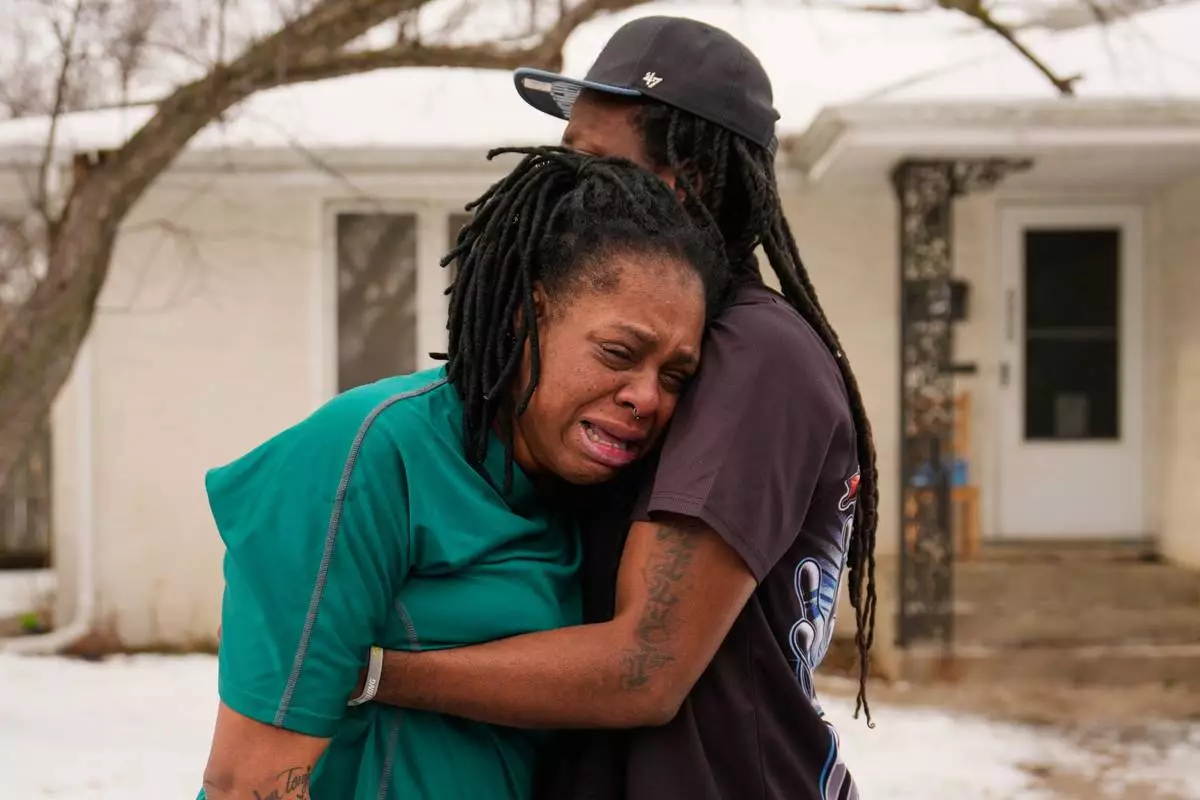
A family member reacts after federal immigration officers make an arrest Sunday, Jan. 11, 2026, in Minneapolis. (AP Photo/John Locher)
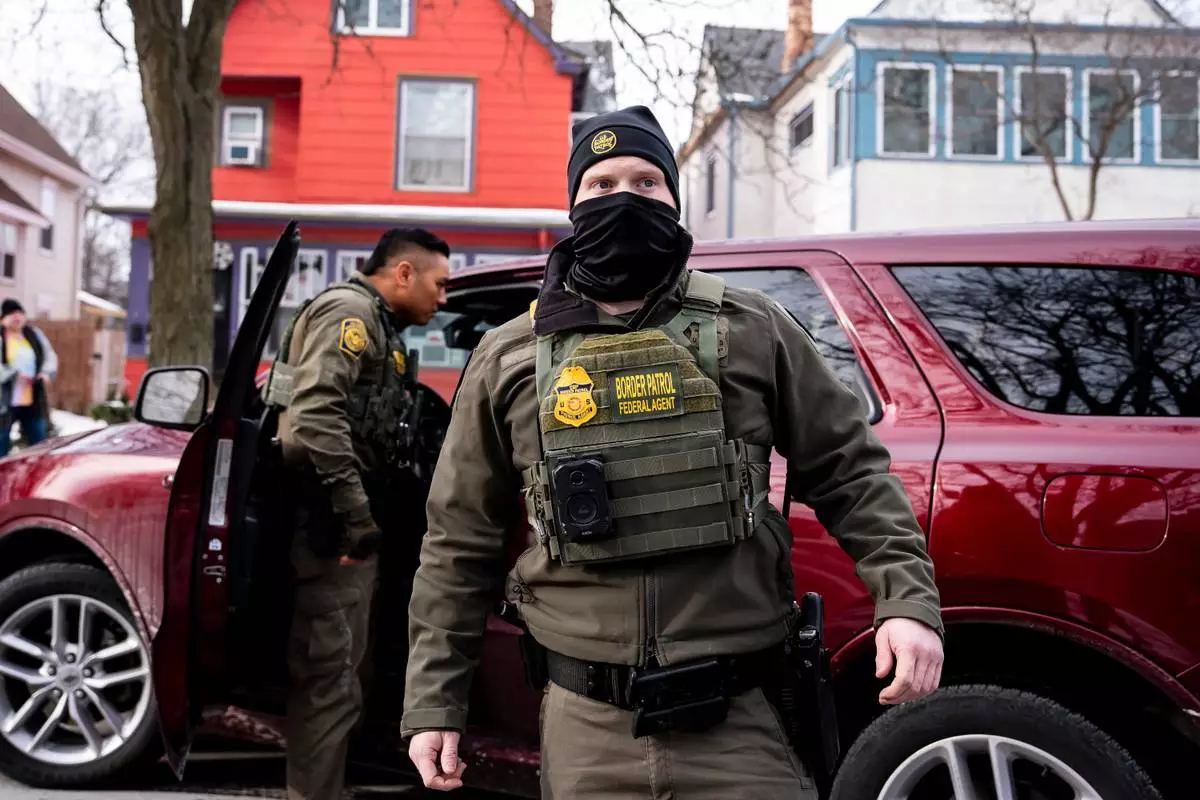
Federal agents look on after detaining a person during a patrol in Minneapolis, Minn., Sunday, Jan. 11, 2026. (Christopher Katsarov/The Canadian Press via AP)
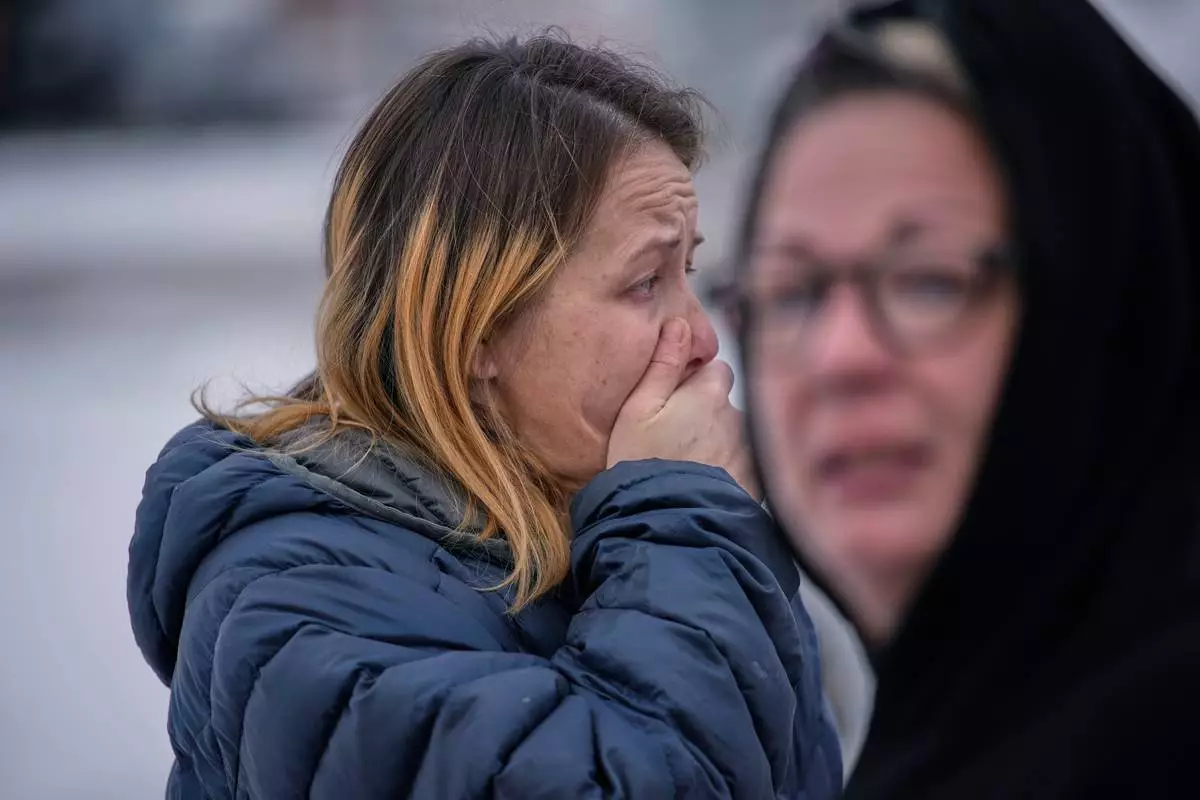
Bystanders react after a man was detained by Immigration and Customs Enforcement (ICE) agents during a traffic stop, Sunday, Jan. 11, 2026, in Robbinsdale, Minn. (AP Photo/John Locher)
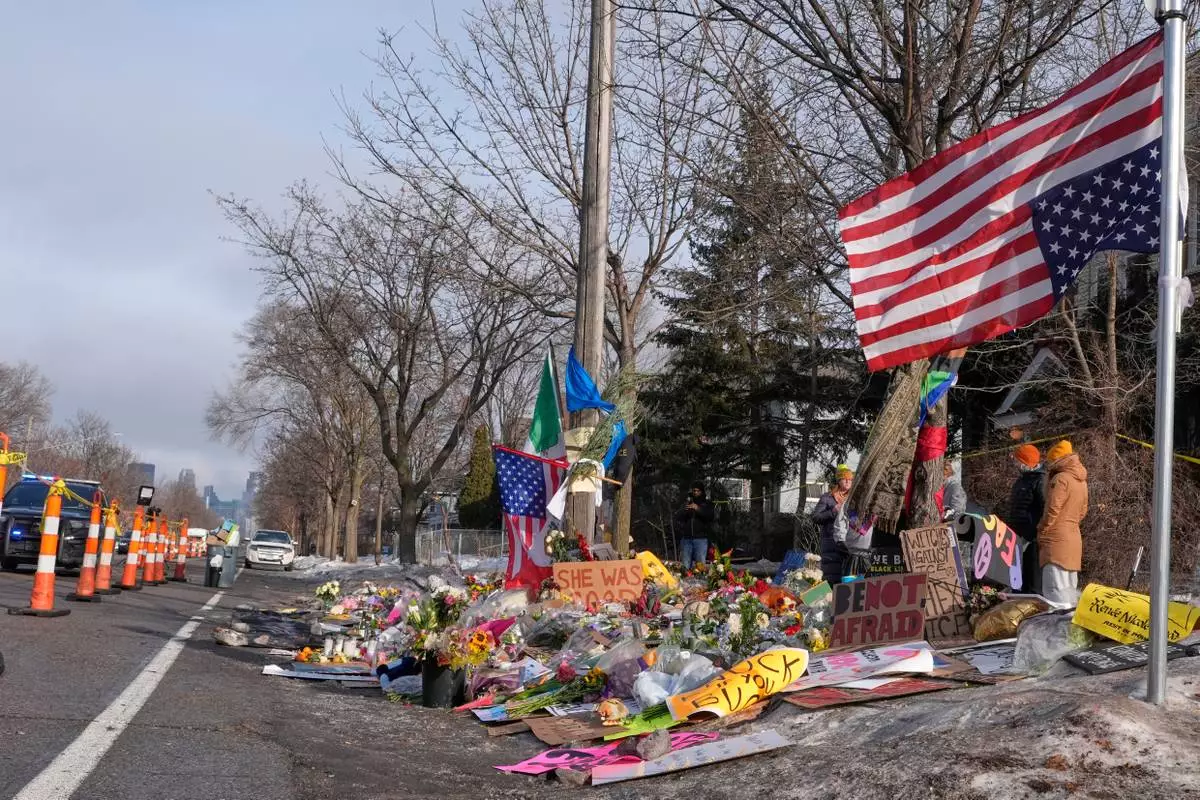
People stand near a memorial at the site where Renee Good was fatally shot by an ICE agent, Sunday, Jan. 11, 2026, in Minneapolis. (AP Photo/Jen Golbeck)
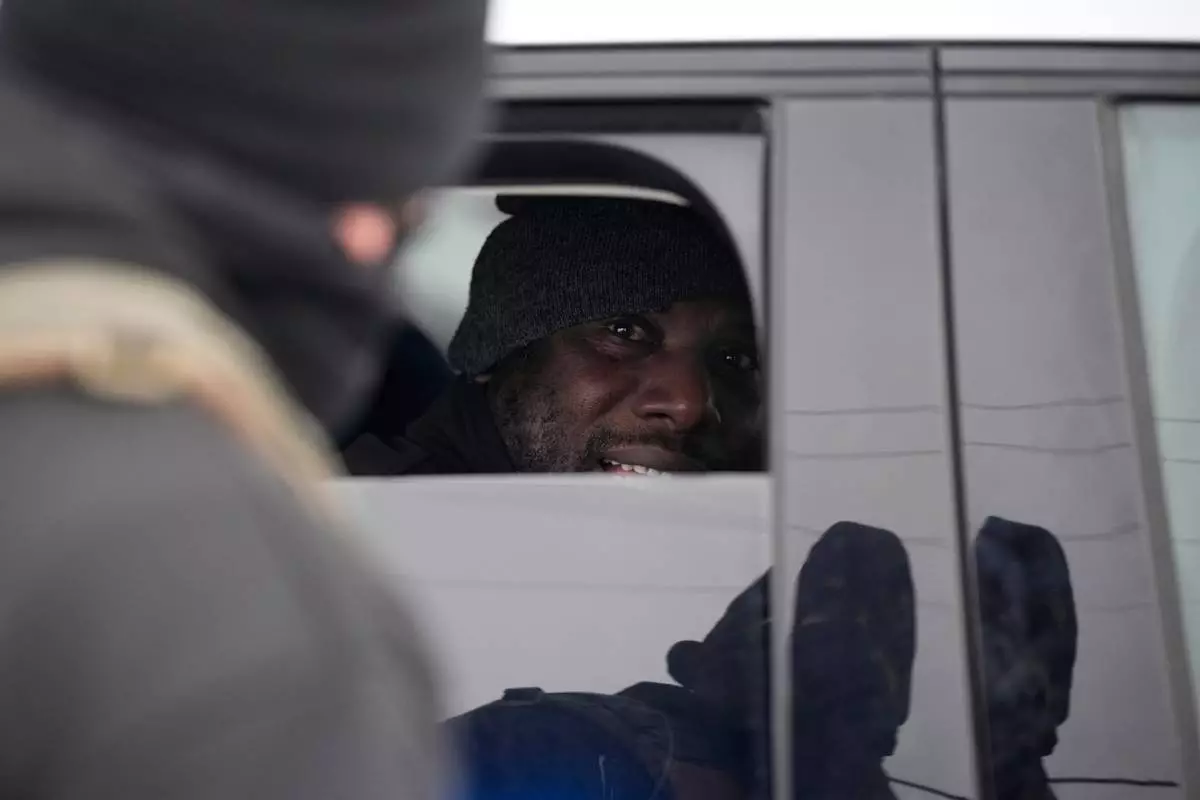
A man looks out of a car window after being detained by Immigration and Customs Enforcement (ICE) agents during a traffic stop, Sunday, Jan. 11, 2026, in Robbinsdale, Minn. (AP Photo/John Locher)
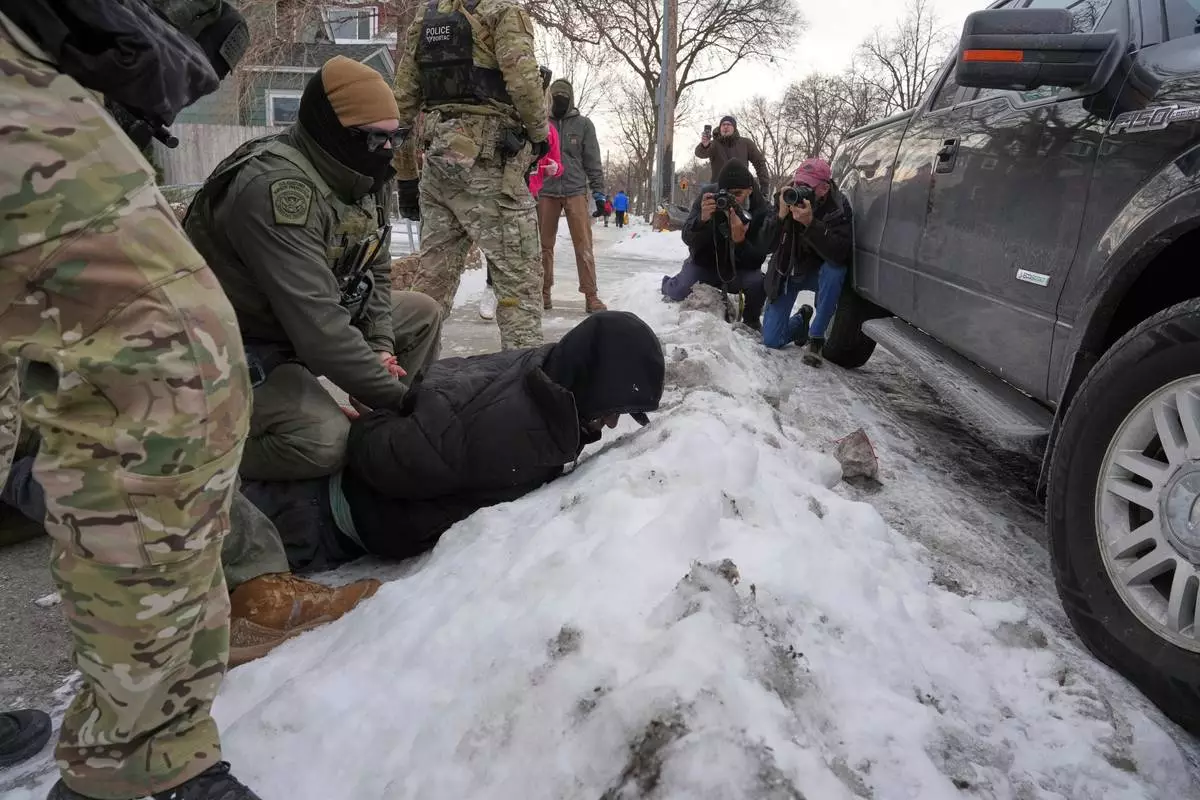
Border Patrol agents detain a man, Sunday, Jan. 11, 2026, in Minneapolis. (AP Photo/Adam Gray)
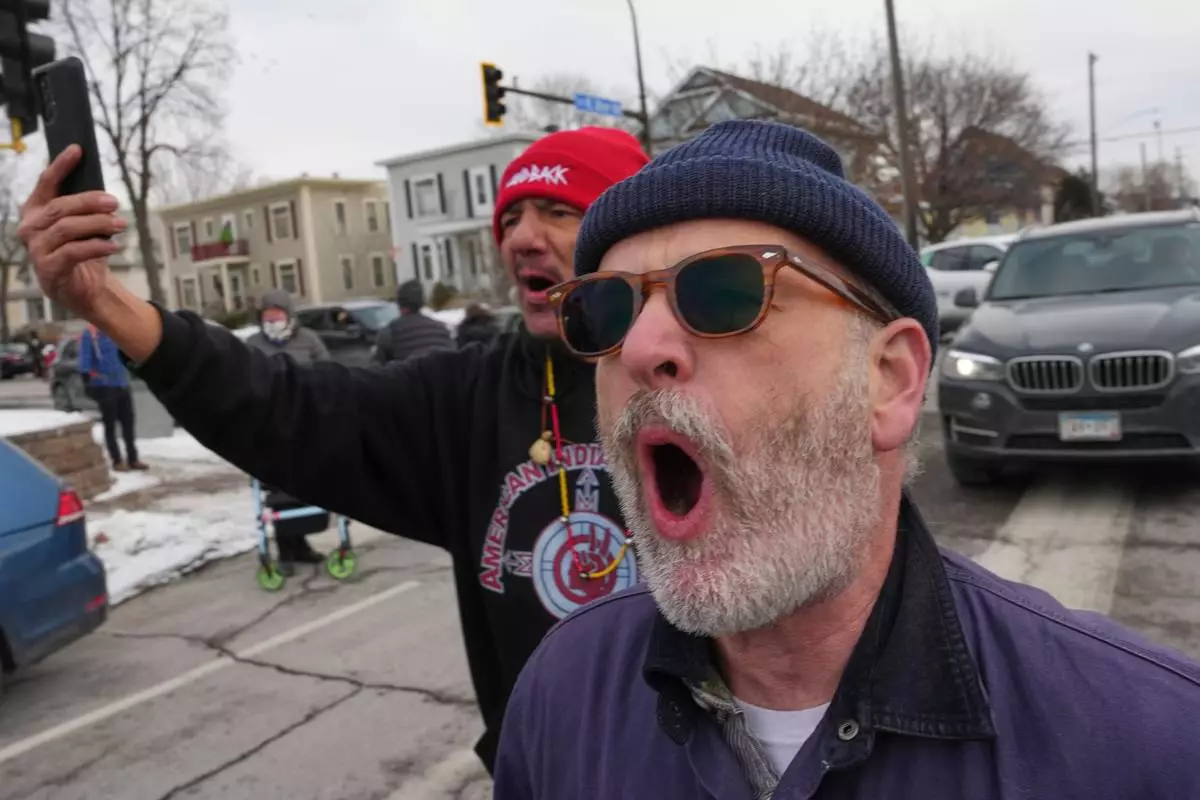
People shout toward Border Patrol agents making an arrest, Sunday, Jan. 11, 2026, in Minneapolis. (AP Photo/Adam Gray)
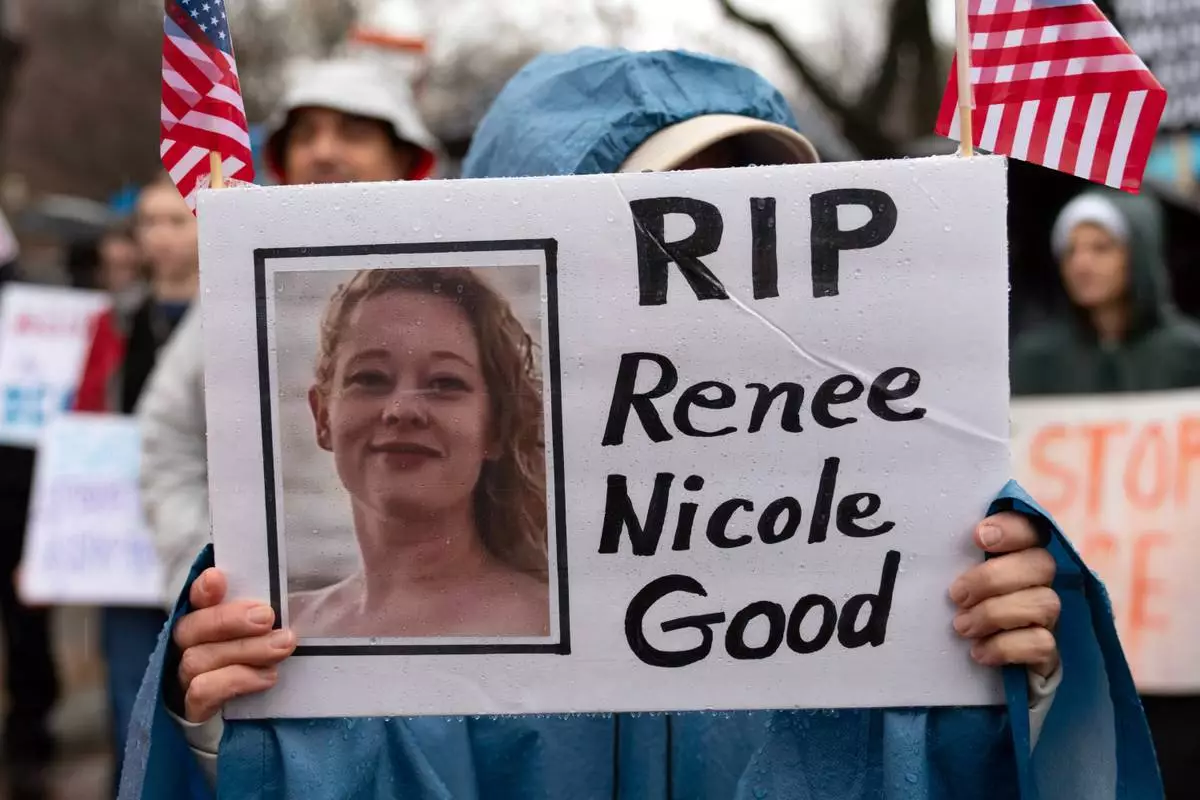
Demonstrators protest outside the White House in Washington, Saturday, Jan. 10, 2026, against the Immigration and Customs Enforcement agent who fatally shot Renee Good in Minneapolis. (AP Photo/Jose Luis Magana)
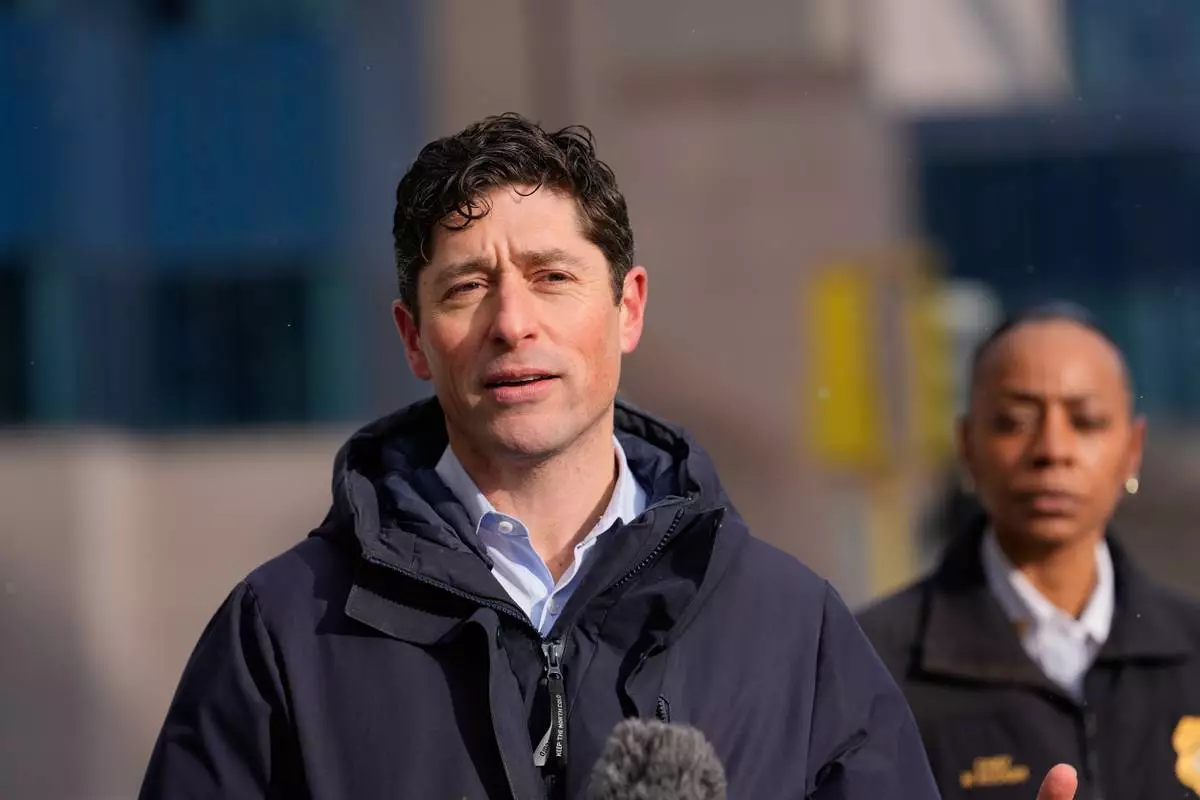
Minneapolis Mayor Jacob Frey holds a news conference on Saturday, Jan. 10, 2026, in Minneapolis. (AP Photo/Jen Golbeck)
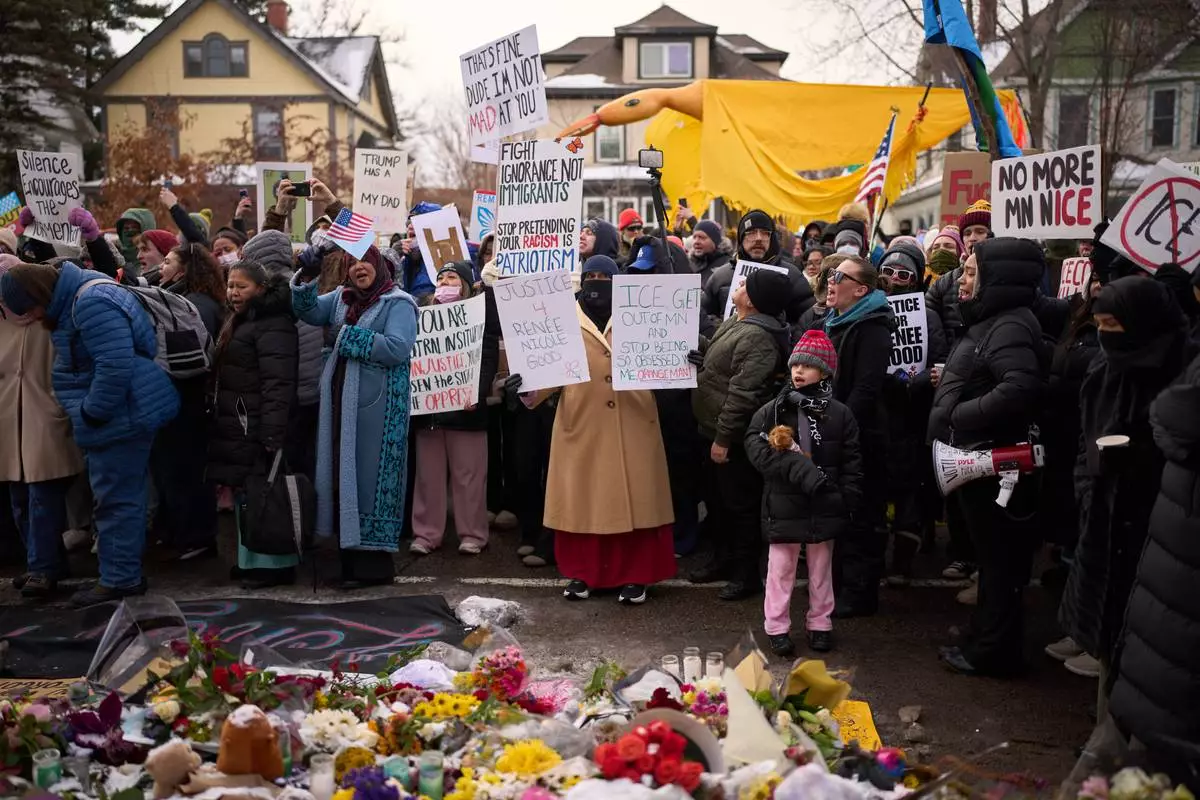
Protesters react as they visit a makeshift memorial during a rally for Renee Good, who was fatally shot by an ICE officer earlier in the week, Saturday, Jan. 10, 2026, in Minneapolis. (AP Photo/John Locher)




